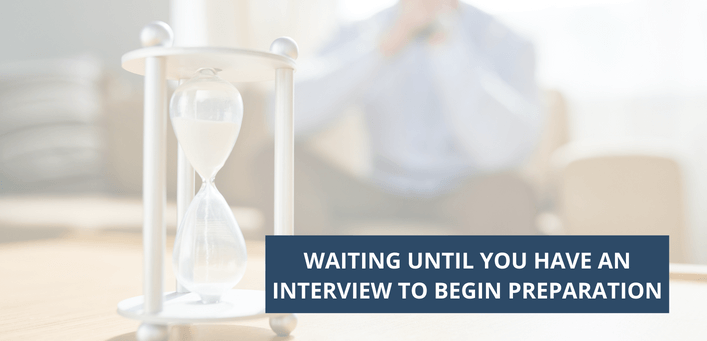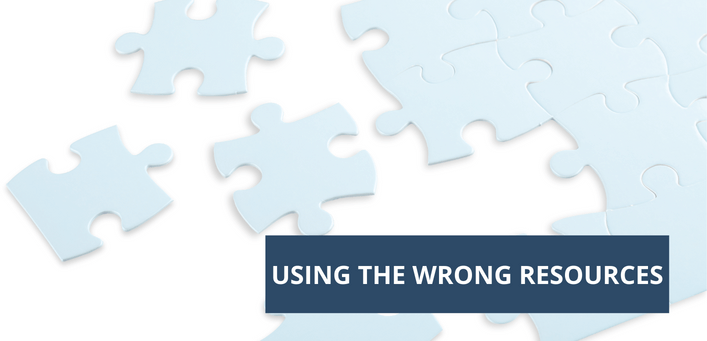While Mary Tyler Moore once said “Take chances, make mistakes. That's how you grow” she probably was not faced with a handful of make-or-break interviews in a condensed timeframe. Rather, it might be more prudent to take a line from Eleanor Roosevelt’s quote book: “Learn from the mistakes of others. You can't live long enough to make them all yourself.” After years of coaching and hundreds of candidates coached, I’d like to help you learn from the mistakes of others. So, what are the most common pitfalls I’ve seen when it comes to case interview preparation?
The Most Common Pitfalls in Case Interview Preparation


The worst thing you can do to yourself in this recruiting journey is to shorten your timeline. The fewer weeks/months you have, the more you have to do each day. Worse, that relationship is not one-to-one. 10 hours spread across 5 weeks is worth more than 20 hours spread across 1 week. Why? Your brain needs time and minimal stress to process the vast amount of information coming it's way. If you shorten your timeline, you move into fight-or-flight mode and your learning becomes limited. You fall short on sleep, wear yourself thin, and don’t allow yourself the time, space, and energy to recharge – you don’t let your subconscious work through problems on its own.
Give yourself ample time (months, not days/weeks) to prepare. Apply to the role when you are 80% ready.


There is so much information out there. Unfortunately, a lot of it is misleading, oversimplified, or simply incorrect. Even if it is correct, it might not be presented or taught in an optimal way, and it might even contradict other (correct) information you have learned elsewhere!
How do you make sense of this information? First, get organized. Figure out what you need to learn and recognize that different resources are good for different things. If you’re organized, you can start to learn what is best for what, and save yourself hours of wasted time!
Second, lean on others. Find others who have gone through and successfully completed the journey. While you should always take their advice with a grain of salt, find out from them what worked and what didn’t.


There are good, free resources out there. If you simply cannot afford paid resources and coaching, that is ok – you can succeed without them. However, what is success worth to you?
If you’re willing to spend $50 on a dinner or a few hundred on a weekend trip, why wouldn’t you spend that to ensure your professional success? In the grand scheme of things - and in the context of a six-figure annual salary just to start – what is a few hundred or even a few thousand dollars? The signing bonus alone can pay for your investment many times over. If paying for a premium resource and/or an expert coach increases your odds by even 10%, it’s worth it.
I’ve worked with candidates who went the free route two years in a row and failed. In their third attempt, after multiple sessions and tailored advice, pointers, and a trained mindset shift, we were able to get them the offer. The line “I just wish I had invested in my case prep sooner” is one I hear all too often.


I can’t tell you how many candidates ask me for the 20+ industry deep-dives I have created (as the only resource that they want). Or how many ask for every single case/casebook I own? Or, how many want to print out my World of Frameworks and memorize it?
That is not how casing works and that is certainly not how consulting works! I had a candidate reach out to me recently, utterly surprised by the fact that a full 80% of his interviews were unconventional. Memorizing frameworks and trying to do 100+ cases is not the way to go.
Think about it this way: Does a strategy consultant get faced with the exact same issue in the exact same industry from project to project? Not a chance! I worked in LNG Vertical Integration, switched to Mining IT PMO, then worked on a Telco Digital Transformation. I knew nothing about these topics or these industries when I joined those teams.
Remember that a case is really just a metaphor for a project. Projects change. Projects do not have a set plan/outcome. Each case is it's own. You need to learn how to approach any problem in an objective-driven structured way, rather than memorizing “everything” and trying to predict your interview.
Stay flexible. Stay adaptable. Don’t be ready for any one thing. Be ready for anything.
5. About the Author
MBB | 100% personal interview success rate (8/8) and 95% candidate success rate | Personalized interview prep
- Professional Experience: Boston Consulting Group, Appian Corporation
- Languages: English, French, Portuguese, Spanish
- Location: USA
Ian started his career at Appian, an IT Consultancy, where he realized how great a company they were (great people, interesting work, and great company and personal growth prospects). He signed on the dotted line and, 4 years later, he had been promoted twice, moved to Australia, and learned a plethora of valuable skills (Client and project management, leadership, database design, IT architecture, coding, etc). This experience built the foundation for who he is today both professionally and personally. Ian joined PrepLounge as more of a "side hustle". He read a lot about personal finance and it has also been drilled into him to have diversified income streams.
However, what started as a 1 or 2 session week gig turned into something far more - it turned out that he gets immense joy and satisfaction from teaching! Now, he focuses a lot more on what he loves to do - contracting/consulting has now ironically become the "side hustle"!
Continue to Learn







 Ian
Ian